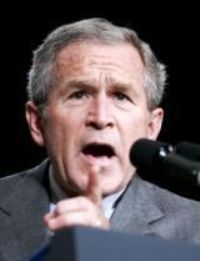United States tighten economic sanctions on Sudan
President George W. Bush said that the United States will tighten economic sanctions on Sudan if it fails to stop the bloodshed in Darfur.

Bush said Sudanese President Omar al-Bashir must follow through on the deployment of the U.N. support forces, allow the deployment of the full U.N.-African Union peacekeeping force and take every necessary step to facilitate its deployment. He must end support to violent militias and reach out to the rebel leaders and allow humanitariean aid to reach the people of Darfur, Bush said.
"If President al-Bashir does not meet his obligations. the United States of America will act," Bush said.
Bush warned of a series of steps if the Sudanese president does not meet his obligations.
Bush said the United States will tighten economic sanctions on Sudan, barring certain companies from taking part in the U.S. financial system; target sanctions on individuals responsible for violence; and apply new sanctions against the goverment of Sudan.
More than 200,000 people have been killed and 2.5 million have been displaced in the four-year conflict in Darfur, which began when rebels from ethnic African tribes rose up against the central government in Khartoum. The government is accused of responding by unleashing the janjaweed militias of Arab nomads _ blamed for indiscriminate killing. The government denies the charges.
The United Nations and U.S. have been pushing Sudan to accept thousands more U.N. troops to build up a combined AU-U.N. force of 20,000. The Sudanese president, however, has repeatedly rejected a U.N. force, but his agreement to the 3,000 troops could be a sign that the pressure was beginning to have an effect.
The Sudanese government, however, had resisted a U.N. force in the past and frequently reversed position after appearing to agree to a peacekeeping mission.
"The time for promises is over," Bush said. "President al-Bashir must act."
The current force of 7,000 AU peacekeepers has been unable to stop the fighting in Darfur. Those who have been driven from their homes in Darfur are living in poorly protected camps in the province and in eastern Chad.
Bush spoke at the U.S. Holocaust Museum to a crowd that included survivors of the World War II atrocities at the hands of the Nazis. He honored Liviu Librescu, a Holocaust survivor who died trying to keep a gunman from shooting his students in a killing spree at Virginia Tech University. Librescu, an aeronautics engineer and teacher at the school for 20 years, saved the lives of several students by using his body to barricade a classroom door before he was gunned down in Monday's massacre.
"We take strength from his example," Bush said.
This week marks the National Days of Rememberance of the Holocaust. At least 1.1 million people, mostly Jews, but also Poles, Gypsies and others, died in the Nazi complex's gas chambers or from starvation, disease and forced labor before Soviet troops liberated the camp on Jan. 27, 1945.
When the president arrived at the museum, several dozen demonstrators were outside pleading for more urgent action to resolve the crisis in Darfur where thousands of people are dying each month from a lack of food, water, health care and shelter in the desert environment.
Before Bush spoke, he viewed an exhibit on anti-semitism and one titled "Genocide Emergency Darfur: Who will survive today?" He looked at photographs of refugees and victims from the region and saw satellite imagery of the region on a computer.
The Internet search company Google is using its online mapping service to call attention to atrocities in Darfur in a project with the museum launced earlier this month. Google has updated its Google Earth service with high resolution satellite images of the region to document destroyed villages, displaced people and refugee camps.
Subscribe to Pravda.Ru Telegram channel, Facebook, RSS!





